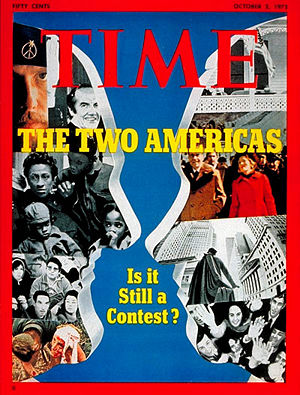United States Presidential Election, 1972
 From Conservapedia
From Conservapedia Republican President Richard Nixon was deeply involved in the strategy of Détente, the plan to end Cold War when he came up for reelection in 1972. He was unanimously renominated by the Republican party for reelection as president.
Contents
Democratic primaries[edit]
Hubert Humphrey accused George McGovern of violating campaign spending limits they had agreed upon. McGovern accused Richard Nixon of failing to "wage an effective war on drugs and narcotics gangsters" and suggested "the Federal Communications Commission should intervene against television and radio commercials suggesting that certain drugs are the answer to emotional or behavioral problems."[1]
Democratic nomination[edit]
The Democratic party was deeply split after their near-collapse in 1968 and in 1972 the leftwing faction won out, then self-destructed. The nominee after a nasty primary battle was South Dakota Senator George McGovern, and initially his running mate was Thomas Eagleton. Eagleton had a secret history of mental illness (complete with electric shock treatments to his brain) that was revealed after he accepted the nomination. Although McGovern said he was "1000% behind Eagleton," the insanity issue threatened to destroy the credibility of McGovern's crusade and Eagleton was forced off the ticket. Numerous leading Democrats publicly rejected the VP nomination until finally a Daley-supporter and Kennedy in-law, Sargent Shriver, accepted. Polls showed Nixon winning a huge landslide, as indeed happened.
General election[edit]
The McGovern camp counted on the vote of young people disaffected by the Vietnam War to boost their support as the voting age was dropped from 21 down to 18. Their turnout stayed low.
Nixon ridiculed McGovern as the far left-candidate of "acid, abortion and amnesty" ("acid" meant illegal drugs; abortion was now an issue; McGovern favored amnesty for draft dodgers.) Instead Nixon promised that peace was at hand, and indeed peace was reached with the Vietnam war ending in January, 1973. It seemed as well that Nixon's détente policy was ending the Cold War. Peace and prosperity against a confused opponent leading a bitterly divided Democratic party.
Nixon was running a nonpartisan campaign separate from the Republican Party in the hopes of winning over many Democrats and independents. He was fearful that this new approach would be sabotaged by the Democrats, so he authorized "dirty tricks" to discover what the Democrats were planning. His operatives broke into the Democratic National Headquarters at the Watergate Hotel, and were caught. Nixon desperately tried to cover up the crime and divert suspicion away from him, and he was successful for a while.
The voters overwhelmingly chose Nixon with the numerically highest popular vote margin in history (though Warren G. Harding won a slightly higher percentage margin in 1920). According to the New York Times, fully one-third of all Democrats voted for Nixon.[2]
Results[edit]
| candidates | popular vote | percent | electoral vote |
|---|---|---|---|
| Richard M. Nixon | 47,165,234 | 60.7% | 521 |
| George S. McGovern | 29,168,110 | 37.5% | 17 |
| John G. Schmitz | 1,106,052 | 1.4% | 0 |
| Benjamin Spock | 79,484 | 0.1% | 0 |
| Linda Jenness | 97,256 | 0.1% | 0 |
| Louis Fisher | 53,814 | 0.1% | 0 |
| Gus Hall | 25,595 | 0.0% | 0 |
Further reading[edit]
- Ambrose, Stephen. Nixon: The Triumph of a Politician, 1962–1972 (1989); hostile but most detailed biography
- Miroff, Bruce. The Liberals' Moment: The McGovern Insurgency and the Identity Crisis of the Democratic Party (2007) excerpt and text search
- Perlstein, Rick. Nixonland: The Rise of a President and the Fracturing of America (2008) very well written narrative of 1964-72
See also[edit]
References[edit]
Categories: [United States Presidential Elections] [1960s] [Cold War]
↧ Download as ZWI file | Last modified: 02/03/2023 17:11:01 | 41 views
☰ Source: https://www.conservapedia.com/United_States_presidential_election,_1972 | License: CC BY-SA 3.0
 ZWI signed:
ZWI signed:
 KSF
KSF